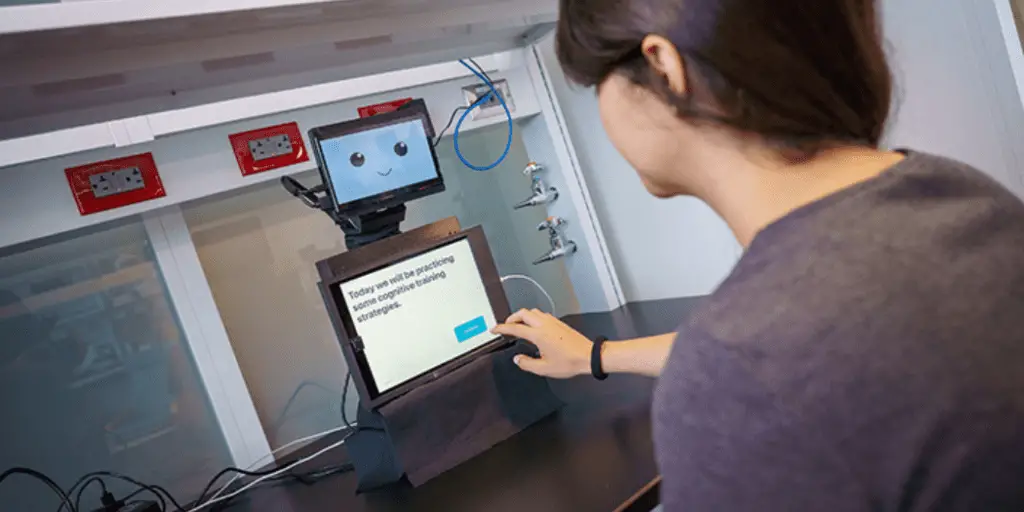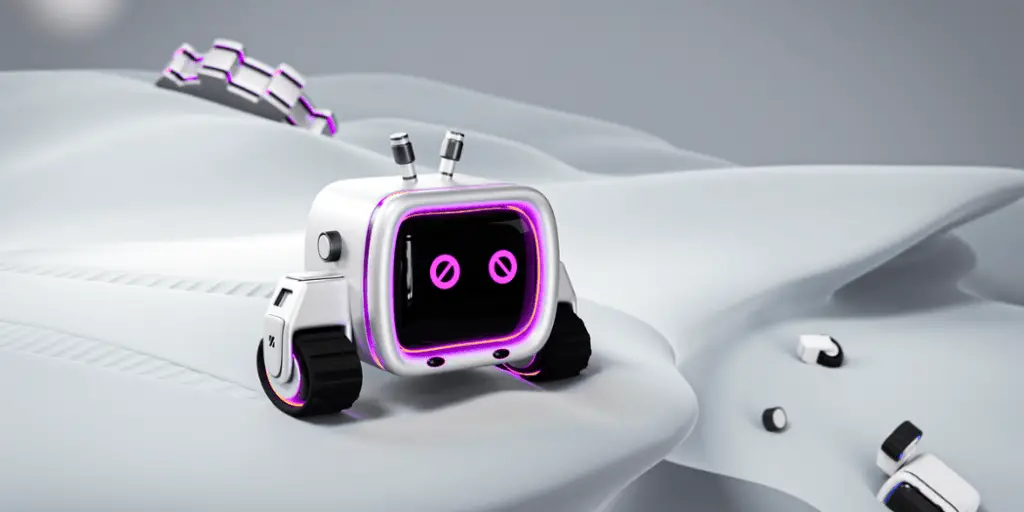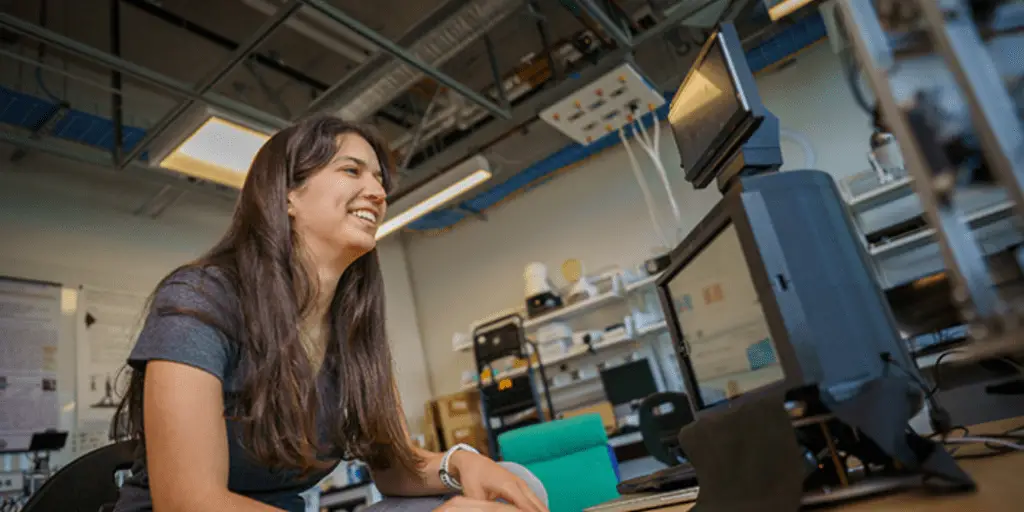Researchers at the University of California San Diego have developed an innovative solution CARMEN, short for Cognitively Assistive Robot for Motivation and Neurorehabilitation.
This small tabletop robot is specifically designed to assist people with MCI in improving their memory, attention, and executive functioning skills at home.
Unlike other robots in this space, CARMEN stands out due to its collaborative development process, involving not just researchers and clinicians but also individuals with MCI and their care partners.
This unique approach ensures that it is not only effective but also practical and user-friendly for those it aims to help.
Development and Collaboration
CARMEN’s development is a result of the dedicated efforts of the research team at the University of California San Diego, who worked closely with a diverse group of stakeholders to create a robot that truly meets the needs of individuals with mild cognitive impairment.
This collaborative approach involved clinicians with extensive experience in cognitive impairments, people living with MCI, and their care partners.
By incorporating insights and feedback from these groups, the team was able to design a robot that is both practical and user-friendly.
The primary goal was to create a tool that provides meaningful and practical interventions to help improve cognitive functions. Professor Laurel Riek, a senior author of the work, emphasized the importance of creating inventions that are not only innovative but also genuinely helpful in real-world settings.

This focus on practical application guided every stage of CARMEN’s development, from its initial design to its final deployment.
By collaborating with clinicians, the team ensured that CARMEN’s functionalities were grounded in effective cognitive rehabilitation strategies.
Input from people with MCI and their care partners helped shape the robot’s user interface and interaction design, making it more accessible and easier to use without requiring constant supervision.
This holistic development process sets the robot apart from other assistive robots, as it is tailored specifically to the needs and challenges faced by individuals with MCI.
Mild Cognitive Impairment
Mild cognitive impairment ‘MCI’ represents a transitional phase between the typical cognitive decline associated with ageing and the more severe decline found in dementia.
Individuals with MCI experience noticeable changes in mental functions, such as memory, attention, and executive functioning. These changes are not severe enough to significantly impact daily life or independent living.
MCI affects approximately 20% of individuals over the age of 65, with up to 15% of those affected progressing to dementia each year.
The condition can manifest in various ways, often impacting an individual’s ability to remember recent events, manage time, follow complex conversations, or make decisions.
Despite these challenges, people with MCI can often still perform most daily activities, albeit with increased effort and occasional lapses.
Current pharmacological treatments have been unable to significantly slow or prevent the progression of MCI to dementia.
Behavioural therapies have shown promise in helping individuals manage symptoms and improve their quality of life. These treatments typically involve cognitive training exercises and strategies aimed at enhancing memory, attention, and executive functioning.
CARMEN, the Cognitively Assistive Robot for Motivation and Neurorehabilitation, addresses this gap by providing structured cognitive exercises and strategies to help individuals with MCI maintain and improve their mental abilities.
By focusing on practical, everyday applications, CARMEN supports users in managing the challenges of MCI, ultimately aiming to enhance their independence and quality of life.
Features of CARMEN
CARMEN, the Cognitively Assistive Robot for Motivation and Neurorehabilitation, is equipped with a range of features and functionalities designed to support individuals with mild cognitive impairment in improving their memory, attention, and executive functioning skills.
CARMEN helps users create designated places for important objects like keys and glasses, reducing the likelihood of misplacing them. It also teaches effective note-taking methods to help users remember essential information and daily tasks.
Through engaging and interactive sessions, CARMEN offers cognitive exercises that stimulate memory and attention.
CARMEN is designed for easy, independent use without the need for clinician or researcher supervision. This plug-and-play functionality ensures users can set up and operate the robot effortlessly.

With few moving parts, CARMEN requires little maintenance, making it a practical tool for daily use. Recognizing that not all users have reliable internet access, CARMEN can function effectively with limited connectivity, ensuring continuous support.
Built to last, CARMEN can operate over extended periods, providing consistent assistance to users. The robot communicates instructions and feedback clearly, using simple language and intuitive interfaces.
CARMEN is programmed to express compassion and empathy, creating a supportive and encouraging environment for users.
To prevent cognitive fatigue, CARMEN includes scheduled breaks after challenging tasks, helping users stay engaged and motivated.
CARMEN was deployed in the homes of individuals with MCI and clinicians, where it assisted with tasks like organizing household items and managing calendars.
Participants reported finding new confidence in using cognitive strategies, with most finding the activities easy to understand and the robot user-friendly.
CARMEN’s combination of cognitive training, user-friendly design, and emotional support makes it a valuable tool for individuals with MCI, aiding them in maintaining their cognitive functions and enhancing their daily lives.
Design and Usability Criteria
The design and usability of CARMEN were guided by a clear set of criteria aimed at ensuring the robot is practical and user-friendly for individuals with mild cognitive impairment.
A key objective was to make CARMEN easy to use independently, without requiring supervision from clinicians or researchers. This meant designing the robot to be plug-and-play, minimizing the need for complicated setups or ongoing maintenance.
To ensure accessibility, CARMEN was created with few moving parts, reducing the likelihood of mechanical issues and the need for frequent repairs.
The design also considered limited internet connectivity, recognizing that not all users have reliable access to the internet. As a result, CARMEN can function effectively with minimal reliance on online resources.
Durability was another important factor in the design process. CARMEN was built to operate over long periods, providing consistent support without the need for frequent replacements or upgrades.
Clear communication was prioritized, with the robot using simple language and intuitive interfaces to interact with users. This ensures that instructions and feedback are easily understood, even by those with cognitive impairments.
Emotional support and user engagement were also key considerations. CARMEN is programmed to express compassion and empathy, helping to create a supportive environment for users.
The robot provides breaks after challenging tasks to prevent cognitive fatigue and sustain user engagement.
This thoughtful approach to design and usability ensures that CARMEN is not only effective in improving cognitive functions but also practical and accessible for everyday use by individuals with MCI.
Deployment and Feedback
CARMEN was deployed in the homes of several individuals with mild cognitive impairment and clinicians with experience working with MCI patients. The purpose of this deployment was to evaluate the robot’s effectiveness and gather feedback on its usability and impact.
During the week-long deployment, participants engaged in various tasks with CARMEN, such as identifying routine places to leave important household items and placing functions on a calendar to prevent forgetfulness.
These activities were designed to help users adopt cognitive strategies that could improve their memory and executive functioning.
The feedback from participants was largely positive. Individuals with MCI reported trying strategies and behaviours they had previously considered difficult or impossible.
They found the robot easy to use, with two out of three participants finding the activities easy to understand. One user did struggle with some of the tasks. Despite this, all participants expressed a desire for more interaction with the robot.
Clinicians also provided valuable insights. They observed that CARMEN helped boost participants’ confidence in using cognitive strategies in their daily lives.

Both groups saw the potential for CARMEN to exhibit greater autonomy and be used for additional applications beyond the initial scope.
The positive reception of CARMEN’s deployment highlights its potential to support individuals with MCI in maintaining and improving their cognitive abilities.
Participants’ feedback will be instrumental in refining the robot’s features and functionalities, ensuring it meets the needs of its users more effectively.
The research team presented these findings at the ACM/IEEE Human-Robot Interaction conference in March 2024, where they received a Best Paper award nomination.
The Cognitively Assistive Robot for Motivation and Neurorehabilitation, has shown promise in supporting individuals with mild cognitive impairment.
Developed through a collaborative effort involving researchers, clinicians, and users, CARMEN provides practical cognitive training exercises and strategies.
Feedback from initial deployments has been positive, highlighting its ease of use and potential to boost confidence in cognitive strategies.
As the research team looks to expand its deployment and capabilities, CARMEN stands out as a valuable tool for enhancing the daily lives of those with MCI.


